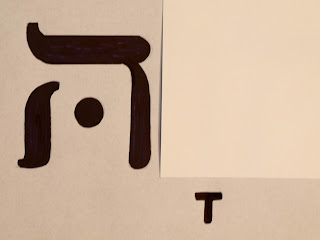Kirjoitettuani jo kahdesti havah/hvh-verbistä, lienee paikallaan kirjoittaa joku sana myös hajah/hjh-verbistä. Sanakirjan mukaan se esiintyy Vanhassa Testamentissa 3548 kertaa, joten en aio niitä kaikkia käydä tutkimaan.
Since I wrote even twice about the verb havah/hvh, it may be moderate to say something about the verb hajah/hjh, too. According to the wordbook it appears 3548 times in the Old Testamemt, and I'm not going to study them all.
Since I wrote even twice about the verb havah/hvh, it may be moderate to say something about the verb hajah/hjh, too. According to the wordbook it appears 3548 times in the Old Testamemt, and I'm not going to study them all.
The first time is Gen. 1: 2.
Rinnastuksen vuoksi haluan poimia vielä pari muuta tekstiä, josta ensimmäinen on 1. Moos. 15: 17:ssa, tilanteessa, jossa Jumala solmii liiton Aabrahamin kanssa...
For a comparison I want to pick up two texts more. The first one appears in the situation, when God is making covenant with Abraham Gen. 15: 17...
ויהי השמש באה ועלטה היה והנה תנור עשן ולפיד אש אשר עבר בין הגזרים האלה
... ja toinen tilanteessa, jossa kerrotaan Jumalan ja Mooseksen kohtaamisesta 2. Moos. 3: 1:ssa.
... and the other one is in the situation, when God met Moses Ex. 3: 1.
ומשה היה רעה את צאן יתרו חתנו כהן מדין וינהג את הצאן אחר המדבר ויבא אל הר האלהים חרבה
Mitä yhtäläisyyksiä näiden tekstien väliltä löytyy?
Maailman luominen alkaa tyhjyydestä ja pimeydestä, Aabraham sai odottaa uhrinsa kanssa pimeän tuloon saakka, ja Mooseksen aloittaessa työpäiväänsä Midianin erämaan yksinäisyydessä Israelin kansan tilanne Egyptissä oli verrattavissa yön pimeyteen.
What kind of similarities we can find in these texts? The creation began from emptiness and darkness, Abraham had to wait with his offering until darkness, and when Moses started his day in the loneliness of Midian the situation of the Israelis in Egypt reminded night's darkness.
Kun pimeys ja synkkyys, ahdistus ja epätoivo vallitsevat (היה), silloin astuu esiin yksi ja ensimmäinen (א), joka tuo valon pimeyteen, kirkkauden synkkyyteen, lohdutuksen ahdistukseen ja toivon epätoivoon. Silloin astuu kuvaan TOTINEN VALKEUS (Joh. 1: 9, 1. Moos. 1: 3; 15: 17b; 2. Moos. 3: 2). Hän on EHJEE (אהיה).
When darkness and gloominess, anxiety and desperation prevail (היה), then comes forth the one and the first (א), who gives light into darkness, brightness into gloominess, comfort into anxiety and hope into desperation. Then comes the TRUE LIGHT (John 1: 9; Gen. 1: 3; 15: 17b; Ex. 3: 2). He is EHYEH (אהיה).

















